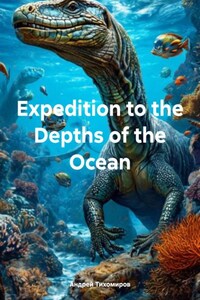One day, Academician Sergeyev called scientists to an important meeting. They were discussing who to send to search for a man named Vasilyev. This man was the only expert on sea serpents on Earth. He had collected a lot of information about the mysterious creatures from old books and newspapers.
Vasilyev really wanted to find the sea serpent, and no one could replace him. But the scientists understood that it was very dangerous. They decided to send the ship's captain to search. The captain was an experienced deep-sea diver, but he did not believe in the existence of sea serpents.
The scientists explained that Vasilyev could hide in the labyrinths under the water, where he could not be found without a ship. They suggested that the captain go on the search alone.
The captain was surprised, because it was very risky. He knew that in such places one could encounter many dangers. But the scientists insisted, and the captain agreed. Of course, if there had been at least one more expert on sea serpents, the commission could have thought about which of them to send. But there was no choice. It would be too cruel and unfair not to send Vasiliev on an expedition that he deserved more than anyone else in the world. But one way or another, it was too late to discuss why Vasiliev was sent on the expedition.
They said that he would have only one assistant – a research robot. The robot would help him collect information and transmit it to the surface.
The captain knew that he had a difficult and dangerous journey ahead of him. But he was ready to take the risk to find Vasiliev.
I understood what they were thinking. They believed that the Medusa submarine was stuck in a trap underwater and could not be pulled out. So, the passengers needed to be transferred to another boat. Medusa is one of the best deep-sea vehicles. It is designed to explore mountain ranges, narrow canyons and volcanoes. It has no equal in terms of safety. I have swum in the depths and have never seen a fish stuck in an underwater trap. And the latest model of the Medusa is also very sensitive to the environment.
– Who will be Vasiliev's partner? – I asked.
– Titov.
I knew Titov. He is a very calm and balanced person. He always follows all instructions, even if something is happening around him.
– And who will be the leader?
– Vasiliev.
Today I am surprised how they chose these people for the expedition.
– Vasiliev should not have agreed! – I said.
– Why? – Sergeyev was surprised. – He is a specialist.
– But you! – I insisted. Now I shared Salnikov's indignation. – How could you agree?
– Or maybe Titov should have been the leader? – Sergeyev looked at me coldly. – This is the first time I would send an expedition whose leader does not believe in its goals and does not know what to study. That would be wrong!
I remained silent.
Titov is a good specialist, but he deals with hydroacoustics, and not with what is needed for the expedition. There is some sense in Sergeyev's words.
– The famous deep-sea biologists were busy, – Sergeyev said, as if he had read my thoughts. – Of the free ones, none were suitable in character or qualifications.
Yes, Titov is an excellent deep-sea swimmer. But if we started with Vasilyev, then everything else fell into place by itself.
– After all, the trip was not considered dangerous, – Sergeyev noted. – No one ordered them to explore this area. They were simply cruising along the canyon – and that's it. What happened, no one knows.
– Tell me, – I asked directly, – do you yourself believe in this?
Sergeyev smiled.
– I understand your bewilderment. In the twenty-first century – and suddenly old sailor's tales. But, you see, whether these are tales or not, may finally become clear in our century. A paradox? There is no paradox. Zoologists are still arguing about some representatives of even land fauna, whether they existed or not. And when scientists discovered a lobe-finned fish last century, they didn't want to believe their eyes. It was believed that the last coelacanths had died out several tens of millions of years ago. And then they caught a few more coelacanths. So, do you think that fossil fish have started to come back? Nothing of the sort. Science expanded its search, and scientists began to come across more coelacanths.
– But somehow no sea snakes have ever been found, – I noted.
– There may be only one or two of these snakes, – Sergeyev said seriously. – And then they were found somewhere in their last refuge.
– For some reason, they used to catch my eye more often, – I said. – And they weren't embarrassed by people. If you believe the books that Vasiliev has.
– Vasiliev believes that sea snakes are deep-sea creatures, – Sergeyev explained just as seriously. – And their bodies were brought to the surface. The excitement, the wind and the imagination of people gave them the appearance of life. Then they were eaten by birds and fish. The creatures died out, and so they stopped being encountered. But perhaps one pair remained.
– And I…
– I am a scientist, – Sergeyev interrupted me dryly. – I need facts. And all sorts of "I believe" or "I don't believe" are not suitable for science.














